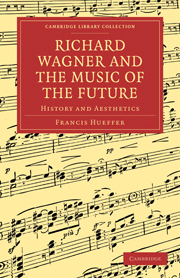CHAPTER III
Published online by Cambridge University Press: 29 August 2010
Summary
Robert Schumann's place in the history of his art, is generally described as that of the leader of the romantic school of music. This name, whether well or ill-chosen, indicates at any rate the relations between his music and the corresponding movement in German literature, known by the same appellation, and it was on these grounds eagerly adopted by Schumann himself. Indeed the whole character of his early efforts is, to a certain extent, explicable only from a literary point of view, and it is also on this close connection with poetical aspirations, that Schumann must rest his claim to the name of (to speak figuratively) the St. John of that important phase of artistic progress which we have called “poetic music,” and as the paraclete of which we recognised the gigantic genius of Richard Wagner. It is true that the works of Schumann's riper years disavow (as he did himself by word of mouth) what he then called his youthful eccentricities, and tend to show that his breach with the established form in favour of poetical impulse, had never been of a very serious kind. Still the fact of his original tendency towards what he himself called “the poetry of art” remains unshaken, and is morever attested by his own philosophical writings on the sources and conditions of musical inspiration. It is herefore in the twofold capacity as a composer and as a literary man that we shall have to consider Schumann in the following pages.
- Type
- Chapter
- Information
- Richard Wagner and the Music of the FutureHistory and Aesthetics, pp. 193 - 239Publisher: Cambridge University PressPrint publication year: 2009First published in: 1874



